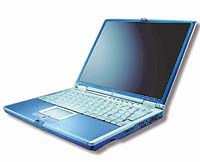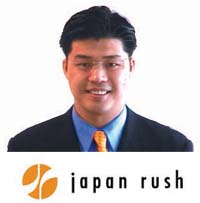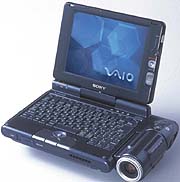 Gadget envy -- you know the feeling. It's when some lucky so-and-so turns up at the office with a sleek new laptop, cellphone or PDA that makes yours seem like something from Jurassic Park. The deepest green envy of all is engendered when the hardware in question can't be had for love nor money in your own country -- usually because it's been picked up by its smarmy owner in exotic Tokyo or Osaka. Gadget envy -- you know the feeling. It's when some lucky so-and-so turns up at the office with a sleek new laptop, cellphone or PDA that makes yours seem like something from Jurassic Park. The deepest green envy of all is engendered when the hardware in question can't be had for love nor money in your own country -- usually because it's been picked up by its smarmy owner in exotic Tokyo or Osaka.
The computer we featured last month in our Innovations story is a perfect example of these small objects of desire -- Sony's PCG-U1 was launched and immediately billed as 'the world's smallest computer.' While it's something of a stretch to make the category fit Sony's PC while excluding other contenders, there's no denying the U1 has been a massive hit. More importantly for our purposes, it's also only available in Japan. Well, not really.
Bridging the gap between Japan's electronics stores and the techno lust of otaku (geeks) elsewhere are several companies that specialize in sourcing Japanese computers and supplying them to overseas customers. We took the recent spurt of orders for the U1 as our cue to talk to two of these specialists in the so-called gray market. Our first port of call was Dynamism, a Chicago company with a 5-year track record in the business, run by Douglas Krone, while the second was JapanRush, a relative newcomer from New York City, operated by Jae Lee.
| Dynamism, Dougals Krone, CEO |

Dynamism Inc.
Web: www.dynamism.com
Toll-free (US): 800-711-6277 Direct (US):312-587-0402
So, what's the company background?
As a technology lover, my own computers were Japanese sub-notebooks. Everywhere I went -- in cafes, airports and hotels -- people would see my discernibly small laptop and ask me how they might buy their own. That's how the concept was formed, and I founded Dynamism in 1997. Today, we still view notebooks as our core product, but the business has expanded to include a multitude of other high-tech gadgets.
Why specialize in exporting Japanese technology?
I think every foreigner remembers their first time shopping for electronics in Japan as a unique, overwhelming experience. Japanese consumer technology is superior to the rest of the world. It turns out that Japanese consumers emphasize technology when they buy. Manufacturers know that using the best technology gives them pricing power. This inelasticity of demand is a phenomenon particular to Japan. In the West, people go to the store thinking about price-point first, technology second. But Japanese consumers go to Akihabara looking for the best technology they can find. Our customers are as technology-hungry as Japanese buyers. In the West, that is a niche market; it's the one we've built Dynamism around.
Who is the typical customer?
Our customer is a technology aficionado -- usually a corporate executive, or someone who otherwise needs lightweight, mobile technology. It's surprising how pervasive the techno-fetish can be; we have a good number of sports stars, Hollywood names and big-name CEOs. That's great, but of course, it's our everyday customer that has made us successful, and we always keep the focus on providing outstanding service.
What's your most popular product line?
It's certainly our range of ultra-light notebooks. Japan's mobile lifestyle has led to an incredible array of sub-2.5lb (1.2kg) computers, which are popular in the West. We also sell goods like ultra-small digital cameras and the latest GSM phones from Europe. We'll supply anything we can on request -- we really try to be a one-stop high-technology shop.
How does a flashy new Japanese PC get from the stores of Tokyo to your customer's home?
We stock the notebooks at our US office in Chicago, where we convert them to English and FedEx them to the buyer. This allows us to give our US and Canadian customers overnight delivery. We deliver to Europe in about two days and to most of Asia in about three days.
How do you add value for your customers?
The buyer needs to be aware that, in most cases, the product cannot be serviced by the manufacturer in their local country. So, we do a rescue warranty service that pays for round-trip FedEx priority shipping if the computer should need service. And, since the manufacturer will not give technical support (at least not in English), we have our own tech support department. We offer customers unlimited toll-free tech support by phone or email. We also pay all import duties for US customers. For localization, we provide English documentation and install an English version of Windows. Japanese computers come with the Japanese-style keyboard layout, which has some punctuation keys in a different location, so in some cases we offer the option to install a US-style keyboard.
Our process adds value by providing 'Akihabara in America.' We offer full access to the world of Japanese laptops, including full English compatibility, lifetime English support, rescue warranty service and a company culture that reveres customer satisfaction.
How profitable is the business?
Actually the company is private and we do not release these financials. However, we are profitable, and we have experienced 80-100 percent annual revenue growth for the last five years. Consequently, we are doing very well and intend to continue on for a long time.
Who are your direct competitors?
We don't have any direct competitors. A lot of companies spring up, sell a few computers, make a few bucks, then close. They make little difference to our strategy to try to deliver the best technology with the best service on a daily basis.
How do you assess the current market?
Japanese consumers, when it comes to big-ticket spending, continue to be indefatigable. Think of the new Hermes store in Ginza, and try to imagine any other country where a luxury brand opens a $130 million store in the depths of a decade-long recession. As long as Japanese consumers continue to prioritize technology over price-point, the technology gap between Japan and the world will continue.

JapanRush.
Web: www.japanrush.com
info@japanrush.com
Direct
(US): 201-461-9159
So, what's the company background?
I planned the business model from scratch and with the customer in mind -- thinking, "who are they, what do they want, what type of experiences do they want and what are the known problems with this industry?" The business model was purposely built around customer satisfaction, rather than monetary values. Our slogan is: "We sell an experience, not a machine."
Why specialize in exporting Japanese technology?
Simple -- Japan has the most advanced machines in the world.
Why is there a demand for Japanese technology in the West?
The demand for Japanese technology in the West is definitely remarkable -- we have an average of 50 to 100 registrations on our Web site daily. Due to the high price of these laptops, typical customers are either traveling businessmen or technology professionals. However, we believe college students are an untapped market. Due to their financial status, many innovative college students cannot take advantage of what's out there. According to an old Chinese saying: "If you are planning for a year, sow rice; if you are planning for a decade, plant trees; if you are planning for a lifetime, educate people." All business should also take the chance to educate, instead of just benefiting from profits. We are currently working with a third-party institute to donate and lease our products to students at affordable prices.
What's your most popular product line?
Historically, Sony's PCG-C1MSX Picturebook has been the most popular. Although the new PCG-U1 has been gaining popularity, almost 70 percent of our sales are Picturebooks. We also offer special orders to any customer who requests specific items. Depending on the availability of the machine, the delivery takes three to four days from Japan to get to our New York warehouse.
How does a flashy new Japanese PC get from the stores of Tokyo to your customer's home?
Once the laptop is secured at our Japanese store, it is shipped to our New York warehouse for all US customers. Once it arrives here there's a standard checkup for any damages during shipment, then the conversion to English OS with other software and drivers is performed. It's shipped to the customer's home via Overnight Express. Most of the time, the items are actually in stock and are ready to be shipped out. For continents aside from the US, our partners in each specific continent take care of the same procedure.
 Are there any difficulties particular to exporting from Japan?
Are there any difficulties particular to exporting from Japan?
We operate and own an actual store in Japan, thus we do not have any export issues currently.
How do you add value for your customers?
We have two distinct programs: Firstly, the Exclusive Exchange Program was created to resolve the fear that not everyone is happy with the thought of buying an expensive new model from Japan which may become outdated quickly. We offer a free trade-in option guaranteeing from $500 to $1,250 when upgrading. This can be as much as 50 percent of the original cost.
Secondly, the Exclusive Support Program includes a custom recovery CD, which allows the customer to restore the system to its original condition in English. Also, constant updates from our Web site have already gained a reputation as a good source for many customers and non-customers. Also, we pay for all shipping fees to send back to Japan a product in need of repair and we provide a loan computer for repairs taking over one week.
How are your sales?
Currently we are shipping out an average of 50 to 75 laptops per month. Thursday, Friday and Saturday evenings are the sales peaks, but the interesting part is the number of support requests. On Sunday and Monday evenings we are bombarded with support requests. It seems customers use the weekends to try new things.
How profitable is the business?
We have an internal operation model, which allocates 30 percent of the net profit toward customer service enhancement (rebate, referral fees, software experiments et cetera), so our real profit is only 50 percent, since 20 percent is allocated to business maintenance.
Who are your direct competitors?
We are not in a market to just sell laptops. Anyone can sell laptops, but not everyone can sell an experience.
How do you assess the current market?
I am a bit uncertain about this fact. There are obvious cultural differences that prevent certain technologies from becoming available in the US. For example, models such as the U1 are unlikely to become available in the States because of the tiny keyboard size. In fact, that is the exact reason why many smaller cellphones are not available in the States. Also, because Japanese people spend a lot of time traveling and commuting, technologies such as Bluetooth are currently taking off there. Wireless capabilities are catching on in the US, but simply speaking, it is much larger than Japan, so new technology implementations are much slower.
However, that doesn't mean that Japanese laptops have the best technology. The US has often been the first to introduce new technologies, like ABS brake systems or the Tube Color Televisions of the 1960s. Also, the 802.11b wireless specification was designed in the US first.
In short, although Japanese laptop makers do tend to implement new technologies quicker, that does not necessarily mean that the US will always be behind in the technology stakes. Thanks to the Internet, the global village has shortened the long wait for Japanese technologies to reach US shores. @
|
 Gadget envy -- you know the feeling. It's when some lucky so-and-so turns up at the office with a sleek new laptop, cellphone or PDA that makes yours seem like something from Jurassic Park. The deepest green envy of all is engendered when the hardware in question can't be had for love nor money in your own country -- usually because it's been picked up by its smarmy owner in exotic Tokyo or Osaka.
Gadget envy -- you know the feeling. It's when some lucky so-and-so turns up at the office with a sleek new laptop, cellphone or PDA that makes yours seem like something from Jurassic Park. The deepest green envy of all is engendered when the hardware in question can't be had for love nor money in your own country -- usually because it's been picked up by its smarmy owner in exotic Tokyo or Osaka.



 Are there any difficulties particular to exporting from Japan?
Are there any difficulties particular to exporting from Japan?


